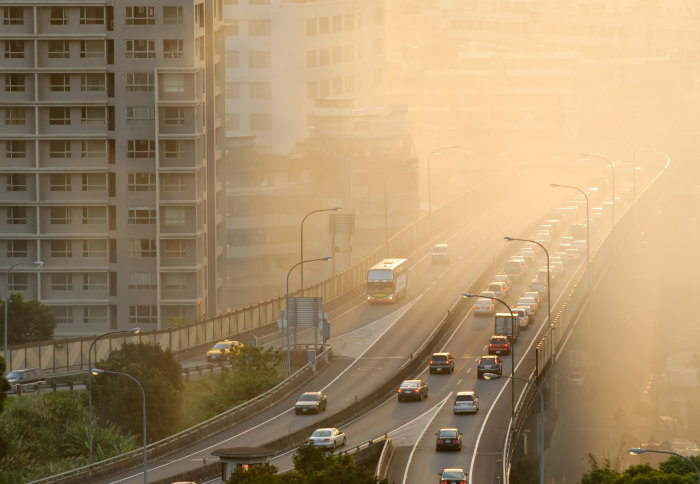5 ways that Imperial entrepreneurs are helping to beat air pollution

The United Nations marks World Environment Day on 5 June, which this year calls for action to tackle air pollution.
Air pollution remains dangerously high in many parts of the world. The World Health Organisation estimates that 7 million people die every year from exposure to polluted air, mainly in low and middle-income countries.
Particles in polluted air can penetrate deep into the lungs and cardiovascular system, causing diseases including stroke, heart disease, lung cancer, chronic obstructive pulmonary diseases and respiratory infections, including pneumonia.
Imperial has a unique entrepreneurial ecosystem, and is the UK's most innovative university, according to Reuters. Imperial entrepreneurs are using their expertise to find new and innovative ways to address this global challenge.
Fast-charging batteries
Breathe Battery Technologies, founded by Mechanical Engineering postgraduate students Ian Campbell and Yan Zhao, is developing fast-charging batteries for electric vehicles.
Electric cars could help reduce harmful air pollution from exhaust emissions. However, currently recharging the battery of an electric car can take many hours. This means that many drivers consider them inconvenient or unsuitable for long trips
The team, who were finalists in this year’s Venture Catalyst Challenge, are developing the technologies to make batteries charge faster, using state-of-the-art control software that adapts the charge to every battery’s unique condition.

Air-friendly advertising
Pluvo - created by former Dyson School of Design Engineering students Lewis Hornby, Claudia Arnold and Nick Hooton -, is designing futuristic roadside structures to tackle air pollution while acting as an innovative advertising medium.
The system, which resembles a large glass chimney, uses “wet-scrubbing” technology which cleans the air in a similar way to rain. The structures draw surrounding air into them, where water droplets attract, collide and combine with pollutants to remove them from the atmosphere.
Holograms could be projected onto the mist to create an attractive visual display, and the team aims to make the system cost-neutral by using this feature as a new advertising medium in high foot-fall areas.
The team behind Pluvo were finalists in the 2018 Venture Catalyst Challenge.

Smelting alternatives
Ola Hekselman, a postdoc from the Department of Materials, has co-developed an eco-friendly process for recycling lead-acid batteries.
The current process for recycling lead-acid batteries includes smelting – which involves melting down lead-containing battery components from the used batteries and extracting the lead - but this can cause toxic air pollution.
Ola’s venture Solveteq aims to replace smelting with a new low-pollution technique utilising deep eutectic solvents. These are environmentally friendly, benign chemicals, and allow lead to be recovered at much lower temperatures than smelting.
Ola was a participant on the 2018 Techcelerate Programme for entrepreneurial postdocs.

BioSolar Leaves
Imperial is collaborating with startup Arborea to develop pioneering ‘BioSolar Leaf’ technology to improve air quality in White City.
Arborea’s technology, which is the first of its kind in the world, purifies the air through the photosynthesis of microscopic plants, removing greenhouse gases from the environment whilst generating breathable oxygen. The system also produces a sustainable source of organic biomass from which Arborea extracts nutritious food additives for plant-based food products.
Arborea was founded by alumnus Julian Melchiorri, who completed two masters in Innovation Design Engineering in 2014, a course administered jointly by Imperial College London and the Royal College of Art.

Sensing pollution levels
BlakBear, co-founded by Bioengineering PhD students Max Grell, Michael Kasimatis and Giandrin Barandun, is developing cheap, disposable stick-on air pollution sensors.
The sensors are designed to be stuck on the back of a smartphone, which can power them wirelessly. Data gathered by the sensor is sent to an app in the phone to be matched to its location tracking.
The team hope that their innovation could provide much better insights into pollution hotspots for city dwellers.
BlakBear, formerly called OpenSense, were runners up in the 2017 Venture Catalyst Challenge.

Supporting entrepreneurs at Imperial
Imperial supports it's community, from undergraduate students through to academic staff, to found innovative businesses that could tackle key societal challenges.
Support offered by the College includes Imperial’s Enterprise Lab, a hub for budding student entrepreneurs, and accelerator programmes such as Techcelerate and the MedTech SuperConnector which support early career researchers to explore the commercial potential of their work.
Imperial’s White City Campus, is home to the White City Incubator, which provides access to state-of-the-art laboratories, office space, as well as an incubation programme to help startup companies grow and develop.
Find out more about support for enterprising staff and students at Imperial.
Article text (excluding photos or graphics) © Imperial College London.
Photos and graphics subject to third party copyright used with permission or © Imperial College London.
Reporter
Deborah Evanson
Communications Division